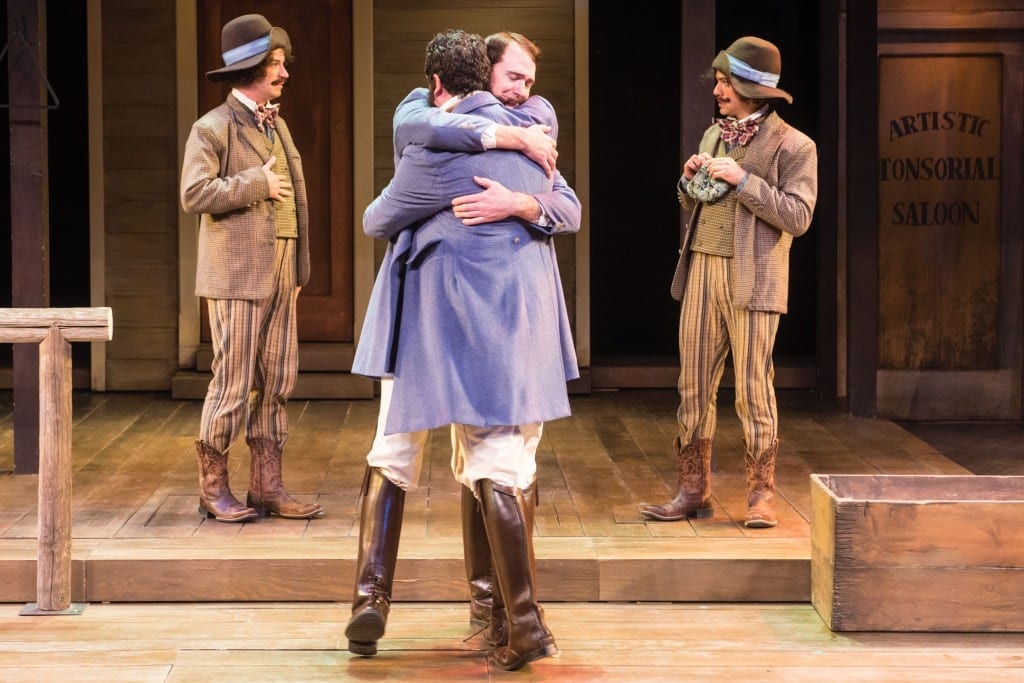CEDAR CITY — Mistaken identity runs rampant in Shakespeare‘s The Comedy of Errors, a farcical romp that is given new life in director Brad Carroll‘s wild west interpretation of this comedic favorite. When Egeon of Syracuse is given news of his impending death for reasons of trespassing upon Ephesus soil, a law enacted against those of Syracusian heritage. Egeon explains that he lost both his wife and son in a tragic shipwreck, and that the twin he’d saved from the wreckage with left home at eighteen to seek his twin brother. Duke (or Sheriff in Carroll’s reimagining) Solinus’s heart softens at the story, and informs Egeon that he may be freed from his fate, if he will pay an exorbitant amount of money in bail.

However, as a stranger in a strange land, Egeon finds few allies ready to pony up the fee for freedom. Meanwhile, and unbeknownst to Egeon, Antipholus (of Syracuse) arrives with his lackey Dromio (of Syracuse), and they quickly adopt a manner of dress familiar to those in Ephesus. It is, however, in Ephesus where Antipholus’s twin brother—also named Antipholus, resides with his lackey, also named Dromio. Hijinks ensue when members of the town mistake one twin for another, when one Antipholi perceives one lackey Dromio as another. And only when all seems lost and the knot is too thick to untangle, does everything find its proper place and family unit is reunited once more.
The conceptual overhaul of this piece is the center of this production, and it worked to excellent effect. I’ve seen many interpretations of The Comedy of Errors, and this was unlike any other. Bold setting in the 1849 California gold rush brought a rogueish energy to the stage, a very tangible excitement that echoed throughout the theater. From the first moment of entering the Adams Shakesperean Theatre, the set (designed by Vicki M. Smith) strikes an energy suggestive of antiquated bar fights, of saloon girls, and rowdy prospectors eager to taste their first gold strike. It is an energy matched by richly textured costumes (designed by David Kay Mickelsen), each with their own spunk and sass, that unfold world of character without a word having to be uttered. The visual spectacle—at times, caricatured in reference to the wild west—gave a strong foundation for this piece’s story. I was appreciative of the little details given both in set and dress, be it a functioning water trough or demure little librarian glasses. All in all, it was an absolute visual treat.

Both lighting (designed by Donna Ruzika) and sound (designed by Paul James Prendergast) layered in elements of drama that only heightened the comedic effect and distinguished flow of performance. Of note were the shift in light and the contemplative music underscoring those soliloquies belonging to Antipholus of Syracuse. The first time the audience saw this theatrical device, the theater filled with raucous laughter. I enjoyed a more stereotypical approach to the accompanying music, keeping in theme with a portraitured glimpse into 1849.
One of the great strengths of this piece, and something I always look for in Shakesperean performance, is a strong sense of storytelling. Indeed, in keeping with the festival theme of “into the words,” a beautiful emphasis was given to the story propelling this piece forward. Despite a tediously slow opening scene (hindered by a running gag that played a little too long), I thought the pace and unfolding of plot worked to great effect in this piece. Anyone looking for a good introduction to Shakespeare will surely find a wonderful beginning in this production. In addition, strength of blocking and use of physical comedy to tell the story kept the potentially-complicated plot clear and forward-moving. I appreciated the momentum of this performance.

The performers themselves deserve praise for a high-spirited enactment of this complex comedy. I was particularly fond of the command Antipholus of Syracuse (played by Chris Amos) brought in the nuances of his interactions. Sweet and gentlemanly with Adriana, he easily switched to a more powerful brashness in status with his servant, Dromio. And Dromio of Syracuse, played by Aaron Galligan-Stierle, brought such a fun and vibrant energy to his performance that it was impossible not to love him. He was one of the few to directly broach the fourth wall and speak directly to the audience, and the result was absolutely hilarious. I appreciated having his weariness and frustration with the situation as our window into the world of the play. Physically, he performed with an exactness, reciprocated by twin Dromio of Ephesus (Misha Fristensky). The two worked in conjunction to form a believable pair of stage twins, and the consequential reunion was an absolute delight. Of merit, additionally, was Cassandra Bissell‘s distinct Adriana. Her dramatics were performed with such an intensity of sincerity that I found the entire performance endearing. And the usual shrewishness of her character was rewarded with a delightful sweet sincerity upon the play’s conclusion.
In the end, the Utah Shakespeare Festival has a cohesive, fast-paced comedy with a delightfully rowdy feel that is suited the Bard’s irreverence. I loved the wordplay throughout the play, and little homages to classic gold rush interpretations (including a little videogame bit at the end) brought a smile to my face. There are a lot of details that separate this Comedy of Errors from others I’ve seen, and the amount of thought put into production resonates well. I’d highly recommend Utah Shakespeare Festival’s The Comedy of Errors to anyone, whether Shakespeare aficionado or first-timer.
[box type=”shadow”]The Utah Shakespeare production of The Comedy of Errors plays various dates at 2 PM and 8 PM through August 30 at the Adams Shakespearean Theatre on the campus of Southern Utah University. Tickets are $16-73. For more information, visit www.bard.org.[/box]
